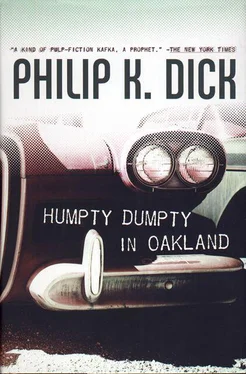The taller Negro said, “You get that old car to run, and maybe we buy it from you.” Both men were very grave; they nodded again and again. “How much you want?” the taller Negro asked. “What you asking for that car, once you get it runnin’ again?”
Al said, “About three thousand dollars.” And that, certainly, was the truth. That was what it was worth.
Neither of the two men batted an eye. “That about right,” the taller said, nodding. They exchanged glances, both nodding. “That about what we expect to pay,” the taller Negro said. “Naturally we not pay that all at once. We work through our bank.”
“That so,” the other agreed. “We put about say six hundred down and the rest on time payment.”
The two Negroes left presently, again telling him that they would return with the taller Negro’s father. Naturally, he had not expected ever to see them again. But sure enough, the next day there they were again. This time they had with them a short, stout old Negro with vest and silver watch chain and shiny black shoes. The two younger men showed him the Marmon and explained, more or less, the situation that Al had put forth. After deliberation, the old man had come to the conclusion that the car would not do after all, and for what seemed to Al to be a supremely logical reason. The old man did not think that they would have much luck finding tires for it, especially along the highway, between major towns. So in the end the old man thanked him very formally and declined the car.
The encounter had stuck in Al’s mind, possibly because after that he had seen a good deal of this particular group of Negroes. They were a family, named Dolittle, and the old gentleman with the vest and silver watch chain was well-to-do. Or at least his wife was. Mrs. Dolittle owned rooming houses and apartment buildings in Oakland. Some of them were in white neighborhoods, and she rented, through a building custodian, to whites. He had found out about this from the two younger men, and after a time he had been able to get a much better apartment for himself and Julie through these people. He and she were living there now, in a renovated three-story wooden building on 56th Street, near San Pablo; they had an upper floor, and it only cost them thirty-five dollars a month.
The reason for the low rent lay in two conditions. First, this particular building was in a non-exclusive neighborhood, which meant that there was a Negro family on the bottom floor and a Mexican boy and girl with their baby on the top floor. It did not bother him to live in the same building with Negroes and Mexicans, but the other condition did bother him; the wiring and the plumbing in the building were so bad that the Oakland city inspectors were on the verge of condemning the building. Sometimes shorts in the walls kept the power off for several days. When Julie ironed, the wall heated up too hot to be touched. All of the people in the building believed that eventually the building would burn to the ground, but most of them were out of it during the day, and they seemed to feel that because of that they were somehow safe. Once, the bottom of the hot-water heater rusted through, and water leaked out, snuffing out the gas jets and spilling across the floor so that it ruined most of Julie’s rugs and furnishings. Mrs. Dolittle refused to make any sort of refund to them. They had all gone without hot water for almost a month, until at last Mrs. Dolittle had found some part-time plumber who could put in another worn-out hot-water heater for ten or eleven dollars. She had a staff of inferior workmen who could patch up the building just enough to keep the city from closing it on the spot; they kept it going day by day. It was her hope, he heard, to sell it eventually to be torn down. She thought that a parking lot might go in; there was a supermarket around the corner which was interested.
The Dolittles were the first middle-class Negroes that he had ever known or even heard of. They owned more property than anyone else that he had met since coming to the Bay Area from St. Helena, and Mrs. Dolittle—who personally ran the string of rental properties—was as mean and stingy as other landladies that he had run up against. Being a Negro had not made her any more humanitarian. She did not discriminate among the races; she ill-used all her tenants, white and dark alike. Mr. McKeckney, the Negro on the floor below, told him that she had originally been a schoolteacher. Certainly she looked like it; she was a tiny, sharp-eyed, gray-haired old woman, wearing a long coat, hat, gloves, dark stockings and high heels. It always looked to him as if she were dressed for church. From time to time she had terrible fights with other tenants in the building, and her shrill loud voice issued up from the floorboards or down from the ceiling, whichever place she was. Julie was afraid of her, and always let him deal with her. Mrs. Dolittle did not scare him, but she gave him something to ponder: the effect of property on the human soul.
Contrarily, the McKeckneys downstairs owned nothing. They rented a piano, and Mrs. McKeckney, who seemed to be in her late fifties, was learning to play on her own, from a book: John Thompson s First Grade Piano Book . Late at night, he heard Boccherini’s Minuet, again and again, played deliberately, all notes getting equal emphasis.
During the day Mr. McKeckney sat outdoors in front of the building, on an apple crate which he had painted green. Later, someone provided him with a chair, probably the big German used-furniture merchant down the street. Mr. McKeckney sat for hours on end, nodding and saying hello to everyone who passed. At first Al was mystified by the McKeckneys’ ability to survive economically; he could not make out any source of income. Mr. McKeckney never left the house and although Mrs. McKeckney was gone a good deal of the time, it was always for shopping or visiting friends or doing good works at the church. Later on, however, he learned that their children, who had grown up and left home, supported them. They lived, Mr. McKeckney told him proudly, on eighty-five dollars a month.
The little McKeckney grandson, when he came to visit, played by himself on the sidewalk or in the vacant lot at the corner. He never joined in with the gangs of kids who lived in the neighborhood year around. His name was Earl. He made almost no noise, scarcely talking even to the adults. At eight in the morning he would appear wearing wool trousers and a sweater, with a grave expression on his face. He had very light skin, and Al guessed that he was heir to a good deal of white blood. The McKeckneys left him to his own devices, and he seemed responsible enough; he kept out of the street and never set fire to anything, as did most of the neighborhood kids, white and colored and Mexican. In fact he seemed a cut above them, even aristocratic, and Al occasionally pondered as to his probable background.
Only once did he hear Earl raise his voice in anger. Across the street two bullet-headed white boys lived, both bullies, with time on their hands. They were the same age as Earl. When the mood came onto them they gathered green fruit, bottles, stones, and clods of dirt, and hurled them across the street at Earl, who stood silently on his sidewalk before his house. One day Al heard them yelling in their chilling voices: “Hey, you got an ugly mama.”
They repeated that again and again, while Earl stood glowering silently back at them, his hands stuck in his pockets, his face becoming more and more stern. At last the taunts drove him to answer.
In a loud, deep voice he shouted, “Take care, little boys. Take care, little fellows, there.”
It seemed to do it. The white boys went off.
Recollections, thoughts, filled Al’s mind. The people who came to look at cars on his lot, kids without money, workmen who needed transportation, young couples; as he stood there in front of the garage with his wife he thought about them, not about what she was saying. She was speaking to him, now, about her own job as secretary at Western Carbon and Carbide; she was recalling to him her desire to quit entirely, someday. He would have to be making a lot more money for her to do that.
Читать дальше










